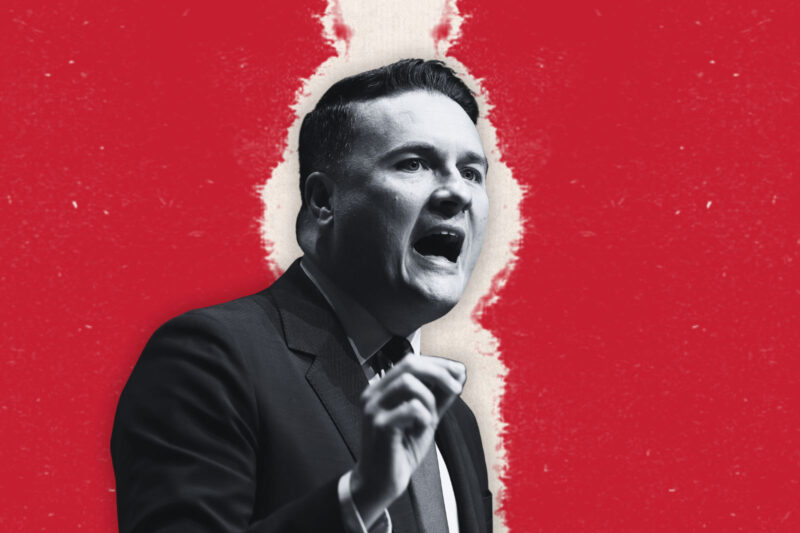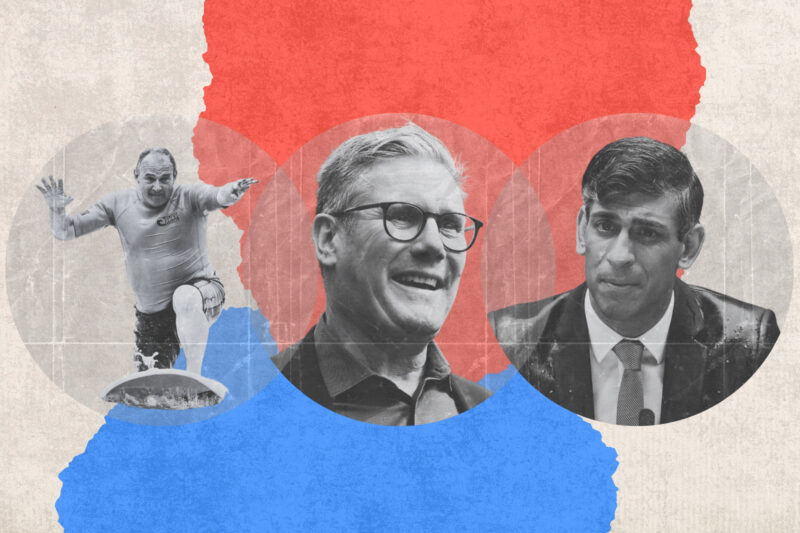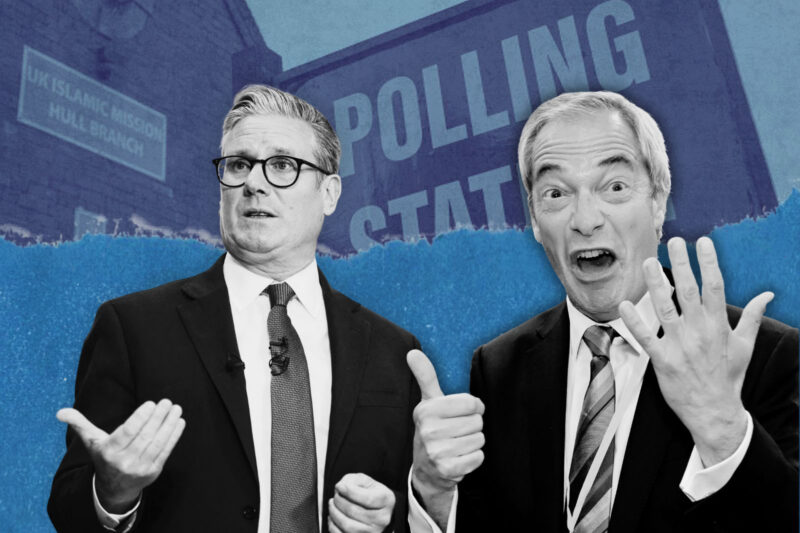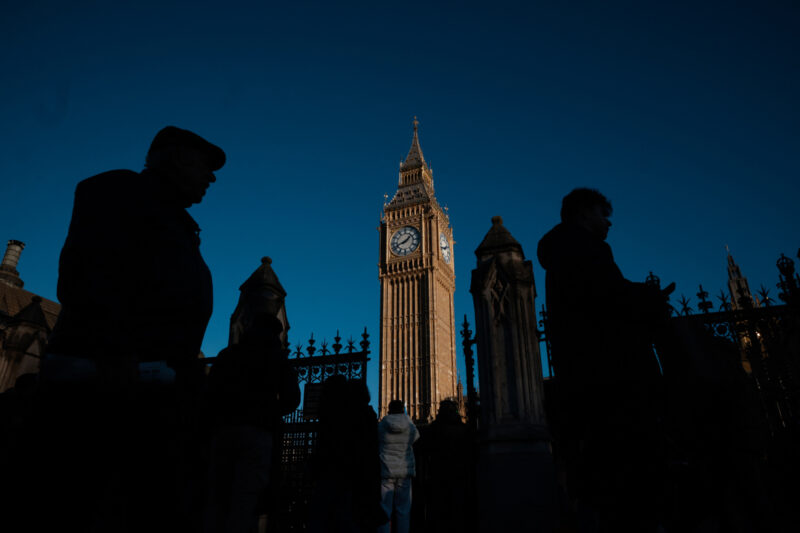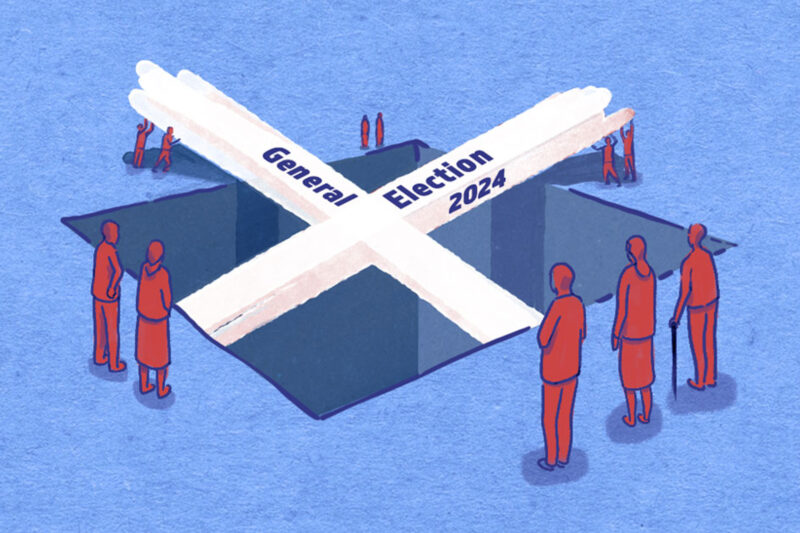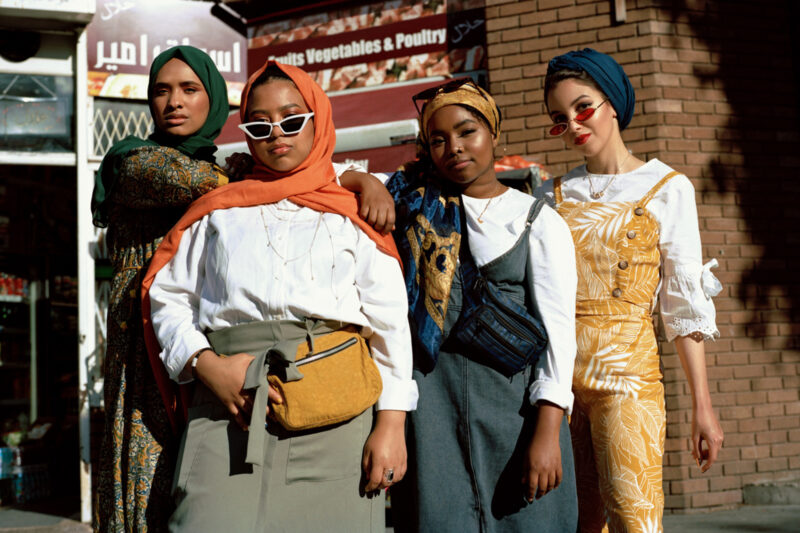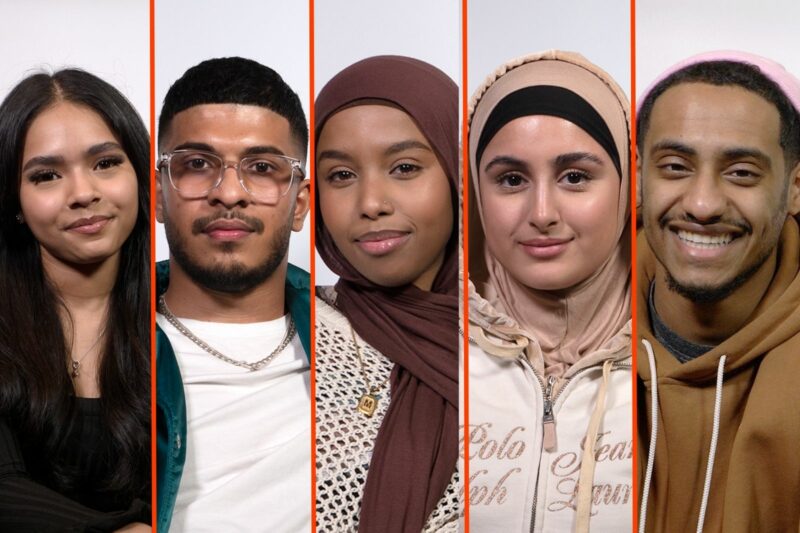UK General Election poll — the figures
The first poll of British Muslims during the 2024 election found some surprising — and not so surprising — results. Here are the numbers
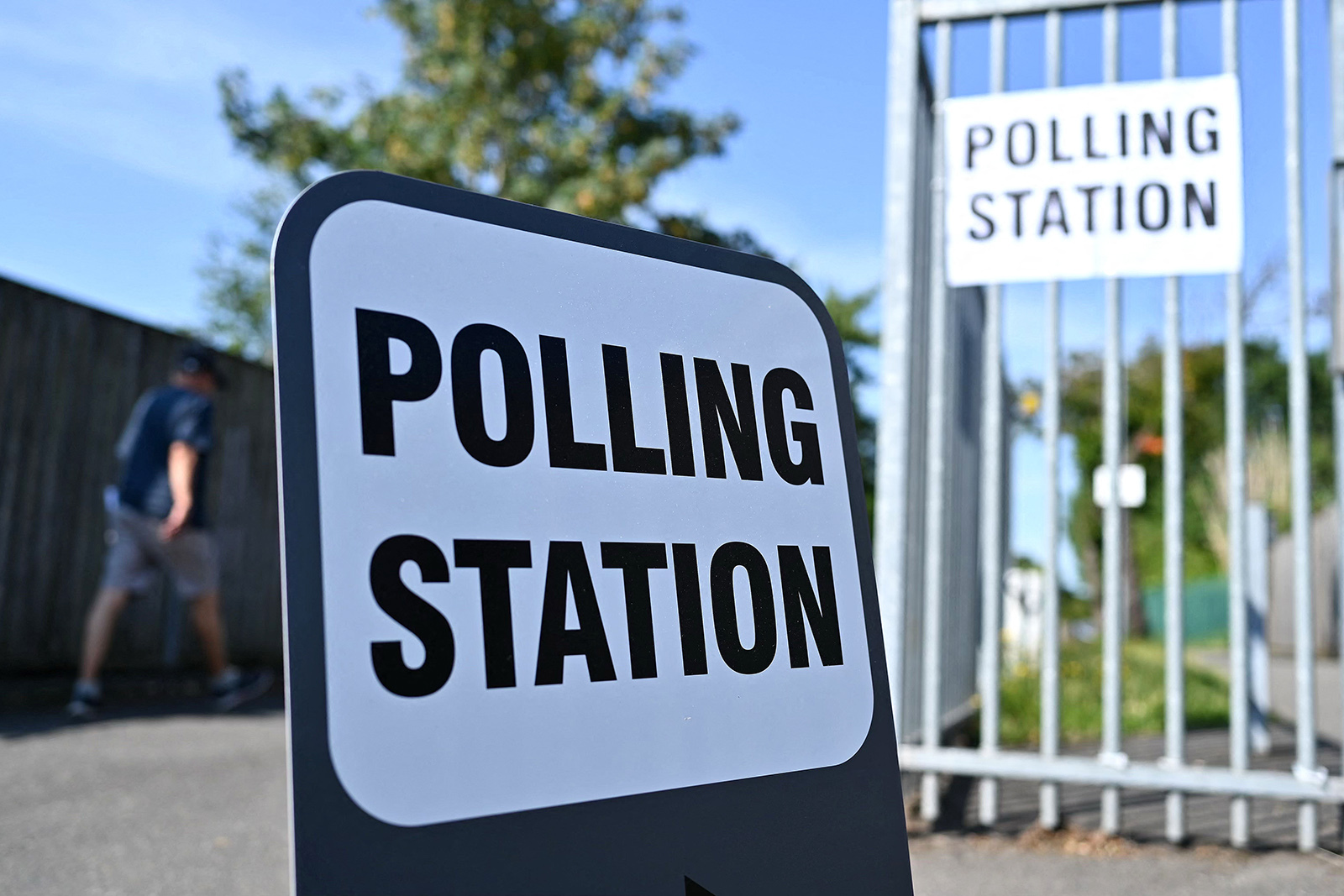
The 2024 UK general election campaign is in full flight, which means it’s peak polling season too. While every day brings new results to mull over, only Hyphen and Savanta have specifically polled the voting intentions and priorities of British Muslims, giving us unique insights into how the UK’s Muslim community intends to vote, and why. We also directed the same questions to a sample of the wider UK population and compared the answers. Here are the full results.
Methodology: Savanta interviewed 2,862 respondents in the UK aged 18+ between 24 May and 3 June 2024.
Voting-related questions were asked to a nationally representative sample of 1,083 UK Muslim respondents, with the data weighted to be representative of UK Muslims aged 18+ by age, gender, region and ethnicity. Voting intention was also weighted by likelihood to vote.
Additional questions were asked to a sample of 1,366 nationally representative UK Muslims, with a boost to ensure a sample of 529 18-24 year olds. Data were weighted to be representative of UK Muslims aged 18+ by age, gender, region, and ethnicity.
A sample of 1,496 nationally representative UK adults was collected to act as a comparison, with a boost to ensure a sample of 527 18-24 year olds. Data were weighted to be representative of the UK population aged 18+ by age, gender, region, ethnicity and religion.
VOTING INTENTION
If there were a General Election tomorrow to elect MPs to Westminster, which of the following parties do you think you would vote for or would you vote for another party? Base: All respondents likely to vote and expressing a voting intention (excl. 18-24 boost) (Muslim May 2024 N=774; Muslim Nov 2023 N=709)
The ‘Other’ figure includes Northern Irish parties and Plaid Cymru.
Savanta previously interviewed 1,032 UK Muslims aged 18+ online on 27 October – 3 November 2023.
• Labour's lead remains strong among UK Muslims, with the proportion intending to vote Labour unchanged since autumn 2023 (63% vs. 64% previously).
• Labour are retaining 77% of their 2019 Muslim voters (down from 84% in the autumn) with 9% now intending to vote Green and 5% intending to vote Liberal Democrat. However, this effect is counterbalanced by the two in five (39%) 2019 Conservative voters who say they now intend to vote Labour (up from 22% in the autumn).
• The Conservatives' vote share has fallen by 7ppt since our autumn poll, with the Lib Dems (+3), Green (+2) and Other parties (+2) increasing their vote shares.
Q1. You mentioned that if there were to be a General Election tomorrow you would vote for PARTY SELECTED. Thinking about previous elections (Westminster and local elections), which of the following best describes your approach to voting for this party? Base: All respondents with a voting intention (excl. 18-24 boost) (Muslim N=753) (Nat Rep = 838)
- Among UK Muslims with a voting intention, two in five (42%) say they always vote for them, a third (33%) say they have voted for them before, but not every time and one in six (17%) say they have never voted for them before. These figures are relatively consistent with the nationally representative sample (43%, 40% and 13% respectively).
- A third (36%) of UK Muslims who say they intend to vote Liberal Democrat say they have never voted for them before.
- Among UK Muslims who say they would vote for the Labour Party (63%) if there was a general election tomorrow, the majority (52%) say that they always vote for them. Three in the (31%) say they have voted for them before, but not every time, while less than one in 10 (8%) say they have never voted for them before.
- Among UK Muslims who say they would vote for the Conservative Party (12%), similar proportions say they always vote for them (44%) and have voted for them before but not every time (43%). Less than one in 10 (8%) say they have never voted for them.
Q2. You mentioned that if there were to be a General Election tomorrow you would vote for [PARTY SELECTED]. How likely, or unlikely, is it that you'll change your mind between now and when the next election is actually held? Base: All respondents with a voting intention (excl. 18-24 boost) (Muslim N=753) (Nat Rep = 838)
- Among UK Muslims with a voting intention, two thirds (65%) say it is unlikely they will change their mind and a third (32%) say it is likely. Muslim voters are twice as likely as the nationally representative sample (15%) to say it is likely they will change their mind.
- Almost half (48%) of UK Muslims who say they intend to vote Conservative say it is likely they will change their mind, compared to only 28% of Labour-voting Muslims. Among the nationally representative sample these figures are 15% and 12% respectively.
Q3. In which of the following ways, if any, have you engaged in politics in the UK over the last 12 months? All respondents (Muslim N=1,366; Nat Rep N=1,496)
- Two thirds (65%) of UK Muslims say that they have engaged in politics in some way in the last 12 months, with the most popular forms of engagement signing a petition (41%), buying or refusing to make a purchase for political or ethical reasons (22%), and taking part in public demonstrations (21%). This is higher than the share of nationally representative sample of respondents who say the same, with half (49%) saying that they have engaged in politics in some way, with the top form of engagement the same as UK Muslims (signed a petition, 36%), followed by contacting a politician, or government official (15%), and bought or refusing to make a purchase for political or ethical reasons (13%).
- Among both samples, younger adults aged 18-34 are more likely than their older counterparts to have engaged in politics in some way over the last 12 months (73% of 18-24 Muslims and 69% of 18-24 Nat rep sample).
Q4. Which of the following policy issues are most important to you when deciding how to vote at the next General Election? All respondents (Muslim N=1,366; Nat Rep N= 1,496)
- When asked to rank which policy issues are most important to them when deciding how to vote at the next general election, UK Muslims are most likely to select the NHS (57%) within their top five. Other commonly selected policy issues include inflation and the cost of living (51%), and the economy (48%). UK nationally representative respondents are also most likely to select the NHS (70%), inflation and the cost of living (66%), and the economy (56%) among their top five policy concerns, albeit at a significantly higher rate than UK Muslims.
- The next most commonly selected policy issue among UK Muslims was the Israel-Palestine conflict, where 44% ranked this within their top five, with one in five (21%) ranking it first. These figures are consistent with the proportion who said this in the autumn (44% and 20% respectively).
- A significantly smaller proportion of nationally representative respondents ranked this within their top five (12%) and fell behind all other policy issues tested, coming ahead of only transport (7%) within their top policy concerns.
- Among both UK Muslims and the nationally representative sample of UK adults, 18– 24-year-olds are more likely to rank the conflict in Israel-Palestine within their top five policy concerns compared to their older counterparts (54% of 18-24 Muslims and 25% of 18-24 Nat rep sample).
Q4b. You mentioned that the Israel-Palestine conflict is one of the most important policy issues impacting how you vote in the next General Election. If there was a pro-Palestinian, independent candidate standing in your constituency running on the issue of the Israel-Palestine conflict, would you consider voting for this candidate? All respondents who select the Israel-Palestine conflict as an important policy issue to them when deciding how to vote at the next General Election (Muslim N=620; Nat Rep N=209)
- Among the 44% of Muslims who rank Israel-Palestine within the top five policy issues, the vast majority (86%) say they would consider voting for a pro-Palestinian, independent candidate running on the issue of the Israel-Palestine conflict if one was standing in their constituency.
- Among the 12% of the nationally representative sample who rank Israel-Palestine within the top five policy issues, this figure drops to 64%.
Q5. Thinking ahead to the next General Election, to what extent, if at all, do you think the following groups of people are generally a high or low priority for political parties? All respondents (Muslim N=1,366; Nat Rep N=1,496)
- At least half of UK Muslims think that each of the tested groups of people are a high priority for political parties, including young adults (55%), people like them (50%), British Muslims (50%) and older people (49%). The UK nationally representative sample are more divided on whether British Muslims are a priority for political parties in the UK, with three in 10 saying they are a high priority (30%) and a low priority (29%).
- Native UK Muslims are more likely than first-and-second-generation Muslims to say that British Muslims are a high priority for political parties in the UK (58% of native Muslims vs. 48% of second generation and 50% of first generation).
Q6. Thinking about the main political parties in the UK. To what extent, if at all, do you feel like they represent your concerns? All respondents (Muslim N=1,366; Nat Rep N=1,496)
- When asked to think about the main political parties in the UK, UK Muslims are divided, with half (49%) saying that they think they represent their concerns a lot (12%), or a fair amount (37%), whilst a similar proportion (46%) say that the main parties don’t represent their concerns much (33%) or at all (13%). The sample of UK nationally representative adults are more pessimistic, with the majority (59%) saying that the main parties don’t represent their views, compared to around two in five (37%) who say that they do.
Q7. You mentioned that you feel like political parties represent your concerns a lot or a fair amount. Which of the following parties do you feel represent your concerns? Base: All respondents who say political parties represent their concerns (Muslim N=687; Nat Rep N=590)
- Among those who say the main political parties represent their concerns, UK Muslims are most likely to say the Labour party represents their concerns (60%). A smaller proportion say the same for the Conservative party (21%) and the Liberal Democrats (18%), while one in 10 say the Green Party (13%) and Reform UK (10%). These figures are broadly consistent with those from the nationally representative sample (53%, 29%, 15%, 11% and 12% respectively).
- There is a clear age divide among UK Muslims, with younger adults aged 18-34 (63%) and 35-54 (65%) significantly more likely than those over 55 (37%) to say that the Labour Party best represents their concerns, while half (49%) of Muslims over 55 say the Liberal Democrats. This age divide is also reflected in the nationally representative sample, with over half (55%) of young people saying the Labour Party best represents their concerns (vs. 12-19% of other parties). Older adults among the nationally representative sample however are more divided with similar proportions saying the Labour Party (46%) and the Conservative Party (44%).
Q8. To what extent, if at all, have the following changed under the current government in the UK (i.e. since December 2019)? All respondents (Muslim N=1,366; Nat Rep N=1,496)
- The majority of UK nationally representative respondents say the quality of public services (60%), their standard of living (58%), and the accessibility of public services (55%) have decreased under the current government, compared to around one in 10 (15% standard of living; 12% accessibility of public services; 11% quality of public services) who say they have increased since December 2019. Around one in four say they have stayed the same in the last five years.
- Even among those who voted Conservative in the 2019 general election, half say that the quality of public services (52%), the accessibility of public services (47%), and their standard of living (48%) has decreased since the last election.
- UK Muslims are slightly less pessimistic on their standard of living (50%), the quality of public services (43%) and the accessibility of public services (37%) decreasing under the current government.
Katharine Swindells contributed to reporting.
 Newsletter
Newsletter



